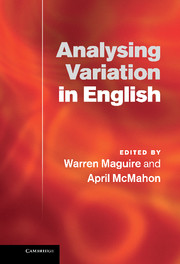Book contents
- Frontmatter
- Contents
- List of figures
- List of tables
- List of contributors
- List of abbreviations
- Introduction. Analysing variation in English: what we know, what we don't, and why it matters
- Part I Investigating variation in English: how do we know what we know?
- Part II Why does it matter? Variation and other fields
- Notes
- References
- Index
Introduction. Analysing variation in English: what we know, what we don't, and why it matters
Published online by Cambridge University Press: 03 May 2011
- Frontmatter
- Contents
- List of figures
- List of tables
- List of contributors
- List of abbreviations
- Introduction. Analysing variation in English: what we know, what we don't, and why it matters
- Part I Investigating variation in English: how do we know what we know?
- Part II Why does it matter? Variation and other fields
- Notes
- References
- Index
Summary
Variation in language is ubiquitous. It is both highly structured and sometimes perplexing; it correlates with external factors, which might be social, or geographical, or something else entirely, but it also follows its own rules and arises for its own, language-internal reasons; it is constant, in the sense that some sort of variation is always there, but it changes its locus within the language across generations, and is a crucial ingredient in language change. Linguists sometimes shy away from variation: it gets in the way when we want to describe straightforwardly ‘what happens in English’, and meet the response ‘not in my dialect’. Sometimes it is used as a default explanation; but at the same time, many recent approaches to linguistic theory see variation ‘as a core explanandum’ (Adger and Trousdale 2007: 274). These paradoxes can be infuriating and challenging, and linguists may choose to engage more or less with variation and its consequences, but the existence of variation is incontrovertible, and, in our view at least, the collection, analysis and explanation of variable data is one of the most lively and fascinating challenges of current linguistics.
Linguistic variation is also subject to a range of complementary and competing approaches and perspectives. The existence of a range of conferences dedicated specifically to work on variation and its historical corollary, change in progress, provide evidence of the liveliness and popularity of the field: so, we find regular meetings in the series Methods in Dialectology, UK Language Variation and Change, and NWAV; while slots and sessions at the Sociolinguistics Symposium, and the International Conferences on English Historical Linguistics, Historical Linguistics, and the Linguistics of Contemporary English are regularly occupied by papers on variation, change and their intersection.
- Type
- Chapter
- Information
- Analysing Variation in English , pp. 1 - 4Publisher: Cambridge University PressPrint publication year: 2011



